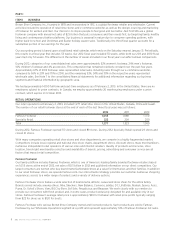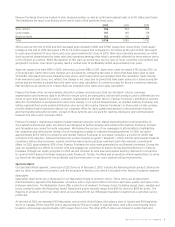Famous Footwear 2012 Annual Report Download - page 20
Download and view the complete annual report
Please find page 20 of the 2012 Famous Footwear annual report below. You can navigate through the pages in the report by either clicking on the pages listed below, or by using the keyword search tool below to find specific information within the annual report.18 2012 BROWN SHOE COMPANY, INC. FORM 10-K
developments in China with respect to our manufacturing facilities. Our operations in China and, consequently, our ability
to deliver products on time and on terms satisfactory to us may be subject to risks such as the following:
• ination or changes in political and economic conditions;
• unstable regulatory environments;
• changes in import and export duties;
• not maintaining appropriate capacity;
• domestic and foreign customs and taris;
• potentially adverse tax consequences;
• trade restrictions;
• possible expropriation and nationalization;
• restrictions on the transfer of funds into or out of China;
• natural disasters;
• labor unrest and/or shortages; and
• logistical and communications challenges.
In addition, we lease the land on which these Chinese manufacturing facilities are located from the Chinese government
through land use rights agreements. Although we believe that we have a positive relationship with the Chinese government,
if the Chinese government decided to terminate our land use rights agreements, our ability to fulfill our customers’ orders
may be negatively impacted. These risks may have an adverse eect on our Chinese manufacturing operations and our
overall business and results of operations.
We may fail to protect the integrity and security of consumer and associate information.
We routinely possess sensitive consumer and associate information as well as provide certain customer and employee data
to third-parties for analysis, benefit distribution or compliance purposes. We have taken reasonable and appropriate steps
to protect that information. However, hackers and data thieves operate sophisticated, large scale attacks that could result in
a breach of our security. In addition, we are required to comply with increasingly complex regulations designed to protect
our business and personal data. Any breach of our network security, a third-party’s network security or failure to comply
with applicable regulations may result in (a) the loss of valuable business data and/or our consumers’ or associates’ personal
information, (b) increased costs associated with implementing additional protections and processes, (c) a disruption of
our business and a loss of sales, (d) negative media attention, (e) damage to our consumer and associate relationships and
reputation, and (f) fines or lawsuits.
Our success depends on our ability to retain senior management and recruit and retain other key associates.
Our success depends on our ability to attract, retain and motivate qualified management, administrative, product
development and sales personnel to support existing operations and future growth. In addition, our ability to successfully
integrate acquired businesses often depends on our ability to retain incumbent personnel, many of whom possess
valuable institutional knowledge and operating experience. Competition for qualified personnel in the footwear industry
is intense, and we compete for these individuals with other companies that in many cases have superior financial and
other resources. The loss of the services of any member of our senior management, the inability to attract and retain other
qualified personnel or the inability to eectively transition senior management positions could adversely aect the sales,
design and production of our products as well as the implementation of our strategic initiatives.
Our reputation and competitive position are dependent on our ability to license well-recognized brands, license our own
brands under successful licensing arrangements and protect our intellectual property rights.
Licenses – Company as Licensee
Although we own many of our wholesale brands, we also rely on our ability to attract, retain and maintain good
relationships with licensors that have strong, well-recognized brands and trademarks. Our license agreements are generally
for an initial term of two to four years, subject to renewal, and there can be no assurance that we will be able to renew
these licenses. Even our longer-term or renewable licenses are typically dependent upon our ability to market and sell
the licensed products at specified levels, and the failure to meet such levels may result in the termination or non-renewal
of such licenses. Furthermore, many of our license agreements require minimum royalty payments, and if we are unable
to generate sucient sales and profitability to cover these minimum royalty requirements, we may be required to make
additional payments to the licensors that could have a material adverse eect on our business and results of operations.
In addition, because certain of our license agreements are non-exclusive, new or existing competitors may obtain licenses
with overlapping product or geographic terms, resulting in increased competition for a particular market.
Licenses – Company as Licensor
We have entered into numerous license agreements with respect to the brands and trademarks that we own. While we have
significant control over our licensees’ products and advertising, we generally cannot control their operational and financial
issues. If our licensees are not able to meet annual sales and royalty goals, obtain financing, manage their supply chain,
























